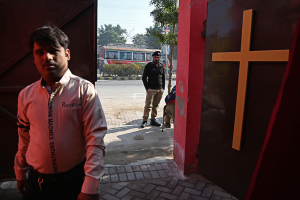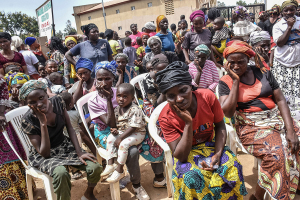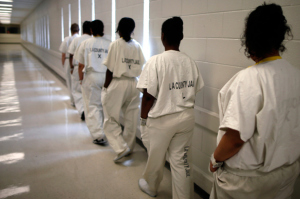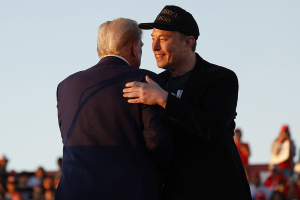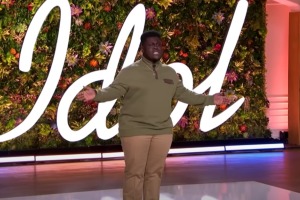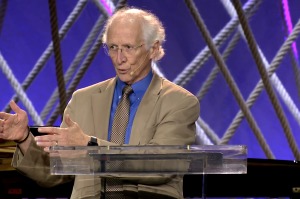Interview: Hurricane Katrina and Theodicy
In the aftermath of Hurricane Katrina, which has devastated lives of thousands, Christians, Jews, Muslims and others are turning to their deity in prayer, causing them to turn to past age-old questions of the traditional foreknowledge debate.
In the aftermath of Hurricane Katrina, which has devastated lives of thousands, Christians, Jews, Muslims and others are turning to their deity in prayer, causing them to turn to past age-old questions of the traditional foreknowledge debate.
In an interview with The Christian Post on Sept. 16, Dr. John Sanders, associate professor of philosophy and religion at Huntington University in Huntington, Ind., and one of the leading open theists, took some time to propose answers to some of these questions.
The following are statements taken during the interview:
Do you feel that God allowed - if not directly - the very hurricane that caused the suffering we're now asking him to alleviate? Was the trigger for the suffering Katrina an "act of God?"
Among open theists two overall responses to the problem of natural evil are discernable. Many open theists use a natural law theodicy in which so-called natural evil is understood to be part of the structures of creation. The structures in themselves are not evil but necessary aspects of the created order. For example, water sustains us but we can also drown in it. Lightning brings essential nitrogen to the soil, but it may also strike us dead or start forest fires. Certain genetic traits that are beneficial for some things may make us susceptible to specific problems. We are learning more and more that certain natural forces that we have labeled “evil” actually have beneficial effects. As our knowledge of the structures of creation and the interconnectedness of the forces of nature increases we cannot easily imagine alternative structures that retain the good elements but lack the ones that can cause us harm.
If God created a world in which air currents and water vapor bring needed rain but these same elements sometimes form hurricanes, then God takes the risk that people will suffer from them. God does not want creatures to be harmed by these natural forces but it may be the case that He cannot have creational structures that nurture without the possibility of harm. The risk of human suffering is simply not avoidable in the world as we know it.
A determinate order in nature is extremely beneficial for our lives since we can plan and live accordingly. God cannot simply remove the possible harm those orders can bring without removing the very determinate order that makes life possible. Some open theists go beyond this and talk about demonic beings that fight against God. In this view, malevolent beings use their free will to help cause disease and disasters and, just as with human freedom, God cannot prevent these beings from wreaking havoc without overruling the very freedom He gave them at creation.
One last point, it should be noted that much of what we call natural “evil” is actually the result of human decisions. For instance, the agricultural practices dictated by the governments of Ethiopia and Sudan have produced famine in these countries. The policies of humans have had disastrous consequences in nature time and again throughout human history but we tend to blame God for such situations. The same is true in the case of this hurricane. The decisions we made to build in certain locations, the destruction of wetlands that protect the coast, and that we did not build the levees adequately, are our fault, not God's. We made the situation much worse than it could have been.
Do you believe He already ordained what has happened and what will happen, no matter what we do?
Unlike our Calvinist friends, open theists do not believe that God foreordains all that happens. Jesus clearly demonstrated that God stands opposed to human suffering. The suffering of the people involved in this disaster is not "all for the good" of these people. History is not an eternal script written by God. God works with us to determine what the future will be. It is not set in stone at this point. God is not micromanaging the events in the world. After all, evil things really happen, things that God never wanted to happen. God is resourceful in working to bring something good out of evil situations but God did not foreordain this disaster to “teach them a lesson.” Though God will use this situation to help us learn and improve our character, God does not have some “secret will” in which He really wanted all these people harmed.
If God is all-powerful and all-knowing, and if He cares about humanity's fate, what is the point of prayer? Doesn't He already know everything that we want and everything that we need?
Yes, God already knows what we need. The point is that God invites us into a dialog and what we disclose to God is what we would like to happen. God does not have to do what we ask but He graciously takes our desires into account when deciding what He will do. Prayer is part of the fabric God has built into the universe. God could meet all our needs without our articulation of them but He has chosen not to operate that way.
Why do you feel we should pray?
We pray for a number of reasons. First, God tells us to. Second, our Lord Jesus prayed and he is our model. Third, God has freely decided to grant us a share in bringing about the future and part of this involves prayer. Prayer genuinely can change things from what would have happened because God has chosen to make some of His decisions contingent upon our prayers.
Dr. Sanders earned his Doctorate of Theology in systematic and philosophical theology from the University of South Africa. Prior to teaching at Huntington University, he served as head of the religious studies program at Oak Hills Christian College in Minnesota. He was also the Extraordinary Fellow at the University of Notre Dame Center for Philosophy of Religion.
Dr. Sanders has authored or edited three books which have been listed in the top 20 of Christianity Today magazine's book of the year awards. One of these, The Openness of God, he co-authored with Professor Emeritus William Hasker (among others). The other two award winning books are No Other Name and What About Those Who Have Never Heard? His latest book is The God Who Risks: A Theology of Providence, published by InterVarsity Press. He is married with five children, three of whom are adopted from India.
















